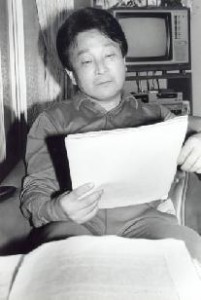The "Moral Adoption" of Hiroshima’s A-bomb Orphans, Part II [1]
Feb. 1, 2009
The gift of a violin prompts reflection
by Akira Tashiro and Masami Nishimoto, Special Reporters
This series of articles continues the story of the "moral adoption" of children in Hiroshima by American citizens. It was originally published in July 1988. The exact spelling of some names could not be confirmed.
A-bomb orphans in Hiroshima who grew up with the support of the goodwill of American citizens are around 50 years old now. They have reached the age when their own growing children are the adolescents they once were. How do the A-bomb orphans view their bonds with their moral parents and how have their lives unfolded?
"I can't believe the letters still exist," said Yukiaki Shimamoto, 52, a junior high school teacher and a resident of the city of Kawanishi in Hyogo Prefecture. Recognizing, with affection, the old letters from his moral parent which have been quietly stored at the Hiroshima Municipal Archive, Mr. Shimamoto looked back on his childhood. "I remember Ms. Zeizar well," he said. "The violin she sent me was a source of great support when I was a teenager."
Back then, Vicki Zeizar lived in the U.S. state of Idaho. She was single and 35 years old, a producer for a radio station. Mr. Shimamoto was 14 years old at the time and he began to communicate with her as a "mother" and "child" in March 1950. A music lover, he asked Ms. Zeizar for a violin in a letter sent three months before the instrument arrived in January 1951. His diary conveys his delight over the gift.
"Oh, I'm so lucky my foster mother gave me a violin, which I had been dreaming about. I'm so happy. My mother is so kind." [On January 12, 1951]
The boy, who was involved in the activities of a music club for three years at junior high school, soon began taking private violin lessons once a week thanks to the assistance of a music teacher. Around the same time, it was decided that he would attend Hiroshima Prefectural Hatsukaichi Senior High School. Mr. Shimamoto was the sort of boy who was envied by the other children at the Hiroshima War Orphans Foster Home.
But in May of 1951, shortly after he entered high school, he fled his home of three years and seven months. He was rebelling against the strict discipline and human relations he felt at the home. At that point, his communication with Ms. Zeizar ended.
After leaving the Hiroshima War Orphans Foster Home, he moved from one place to another in the city of Hiroshima and in the city of Kure in Hiroshima Prefecture. He could not afford the time to think about Ms. Zeizar. But he continued to keep the violin with him, even when he moved to a farmhouse in the former Futami District in Hiroshima Prefecture, to which he had once evacuated during the war. He lived there for four years until he went away to college.
"I wasn't dreaming of taking up music as a career," he explained. "I just wanted to keep the violin by my side and play it sometimes to encourage myself, since I was on the verge of giving up completely."
Still, the boy, raised in Osaka until the age of nine and so had no experience of farming, grit his teeth and worked the rice fields in order to survive. Stealing time away from his farm work, he attended classes in the evening at an area high school.
Holding onto his dream of going to college, he spent his nights studying. Finally, in 1955, he enrolled in the elementary education program at the Nara University of Liberal Arts (now, the Nara University of Education). His major was music, his favorite subject.
The violin, which he had possessed like a treasure, was left at the farm when he entered university and then went missing. "I cherished that violin," he said. "I don't know why I didn't bring it with me." Mr. Shimamoto now only holds a photo of Ms. Zeizar.
Thirty years have passed since he became a teacher in Osaka Prefecture. He has his own family now and his two children are grown. He can finally afford the time to look back on his life.
"I couldn't fully understand Ms. Zeizar's feelings in sending me the violin," Mr. Shimamoto said. "If I could get in touch with her now, I would tell her how grateful I am and that I'm sorry." Mr. Shimamoto has begun to consider settling his psychological debt.
(Originally published on July 24, 1988)








